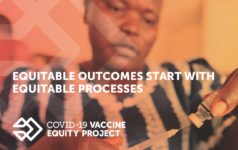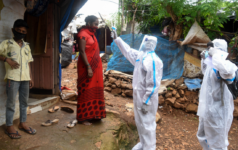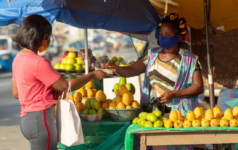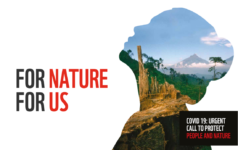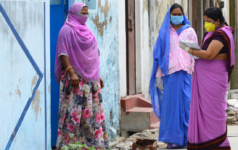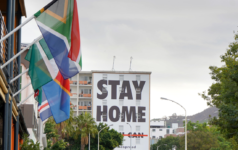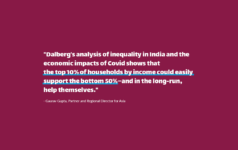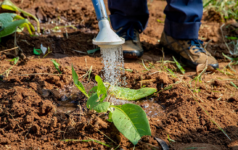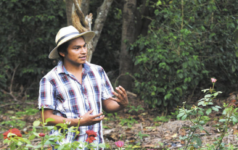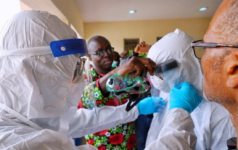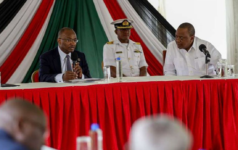Dalberg uses cookies and related technologies to improve the way the site functions. A cookie is a text file that is stored on your device. We use these text files for functionality such as to analyze our traffic or to personalize content. You can easily control how we use cookies on your device by adjusting the settings below, and you may also change those settings at any time by visiting our privacy policy page.
Covid-19 has had a moderate impact on the region to date—but stability is at risk if political reforms stall, or people lose livelihoods.
The African Union (AU) and UNDP have published a report, drafted by Dalberg, titled “The impact of the COVID-19 outbreak on the governance, peace and security in the Horn of Africa countries” which aims to build collective understanding on the unfolding consequences of the Covid-19 pandemic and to identify interventions needed to address the region’s complex crises that will be exacerbated by the pandemic.
To help make sense of the impact of Covid-19 and create recommendations for regional action, Dalberg worked with Africa CDC and UNDP to consolidate trends in epidemiology, governance, and peace and security, across eight countries in the Horn of Africa. The report identifies the key drivers of instability that Covid-19 could cause, namely, the delay of political reforms and disruptions to political stability, increased loss of livelihoods, and increased food insecurity.
Whilst the region’s focus has been on mitigating the health and socio-economic impacts, Covid-19 has the possibility of significantly impacting governance, peace and security and reversing gains made in Africa. Covid-19 could delay electoral processes and could affect accountability, service delivery and the quest for improved governance on the continent.
AU Commissioner for Peace and Security, H.E Ambassador Smail Chergui
The impact of Covid-19 on the region
The Horn of Africa is viewed as one of the most unstable and vulnerable regions in the world with Somalia, South Sudan and Sudan respectively ranked as the 2nd, 3rd and 8th most fragile countries. Before the pandemic, nearly 28 million people in the region were already food insecure and this situation is expected to deteriorate in coming months due to the triple threat on livelihoods of Covid-19, desert locusts and recent flooding. Intercommunal violence and civil unrest in the region has often been driven by socioeconomic grievances, which the pandemic could bring to light.
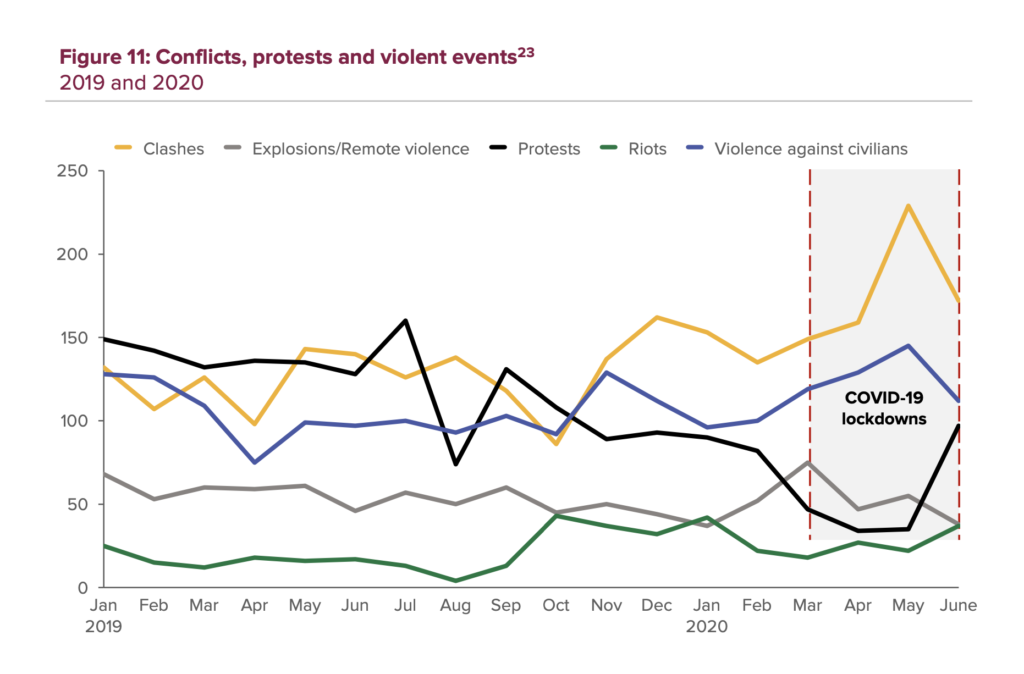
While no major conflicts have emerged since the start of the pandemic, political stability and progress may be tested as the impacts of Covid-19 grow. Elections were postponed in Ethiopia and Somalia, and political participation from civil society and the opposition has been hampered across several countries. Political reform processes in South Sudan, Sudan and Ethiopia are at critical turning points, and Covid-19 could place undue stress that could test new alliances and collaborative processes. Government budgets are likely to be severely strained by the economic fallout, restricting government effectiveness and placing further stresses on fragile governments.
Lockdowns have already strained livelihoods, especially for vulnerable informal workers who account for a significant portion of the region’s workers, with young girls and women highlighted as a key group for intervention. Women make up 70 percent of frontline healthcare workers as well as the majority of informal traders—and their care burden has been further stretched by school closures and limited access to healthcare due to Covid-19. Women have also been subject to increased gender-based violence during Covid-19 lockdowns.
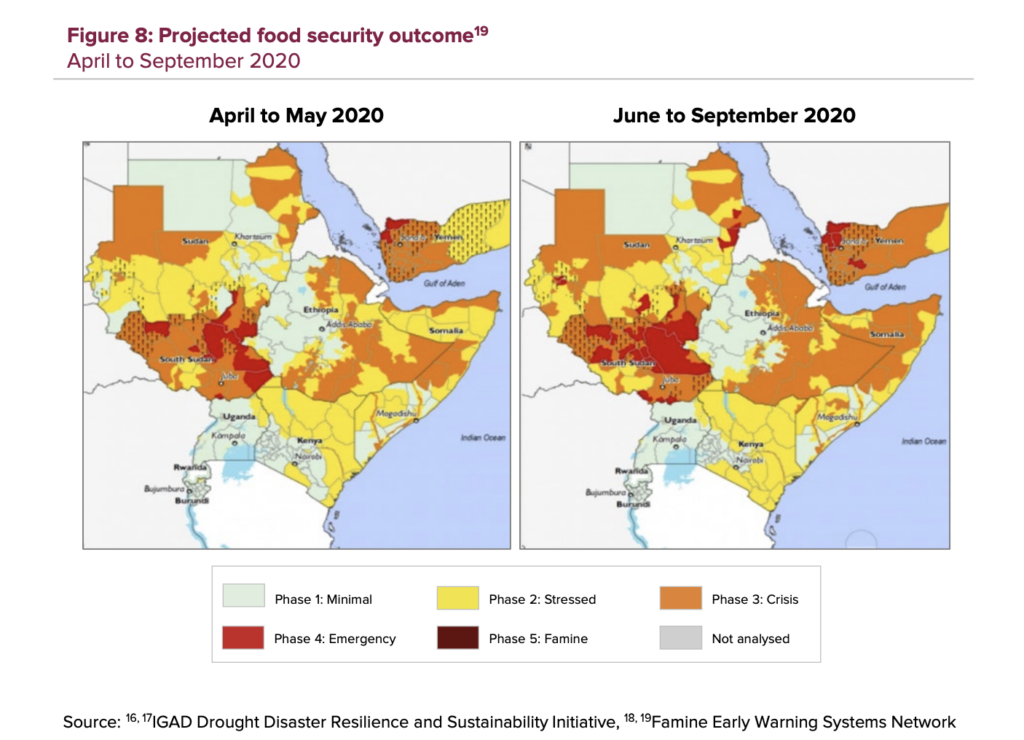
Areas deserving special attention—and regional actions taken
Covid-19 has so far not impacted bilateral relations between countries in the region, and most expect a continuation of pre-existing trends in their relationships. Border regions, on the other hand, tend to be areas of rebel activity and less governance, and have also been significant sources of new Covid-19 cases during the present crisis. In addition, the militant group Al-Shabaab remains a threat to the region that could be strengthened by the loss of livelihoods. Youth are considered the most at risk to extremism and crime.
The report also examines the health and socio-economic initiatives of regional organizations in strengthening the healthcare system, containing the spread of Covid-19, and protecting livelihoods. While many regional initiatives have been impacted by Covid-19, new opportunities have been presented by the crisis, such as initiatives to advance local production and manufacturing. In addition, coordinated responses to the pandemic could strengthen regional and sub-regional solidarity, effecting new coordination mechanisms.
Recommendations to regionally address the downstream effects of Covid-19
The impact of Covid-19 to date has been moderate, though stability is at risk if political reforms stall or people lose livelihoods. The report concludes with a set of recommendations for consideration by the African Union, Regional Economic Communities, member states and international organizations, and offers renewed hope and opportunities for governments, regional institutions, civil society and citizens to support grassroots solutions for conflict prevention, strengthen rapid and collective fundraising for interventions, and explore the potential for intra-African trade among other innovative and context-specific solutions.
Read the report here.

